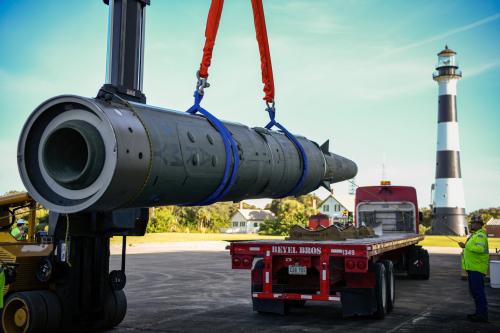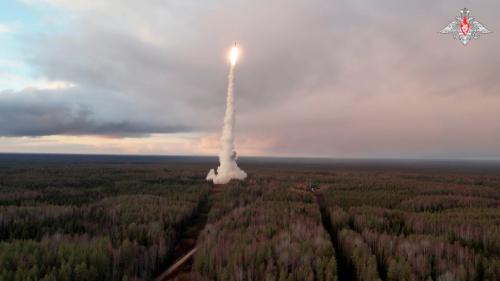U.S. and North Korean negotiators meet this week for only the fourth time in three years to discuss Pyongyang’s nuclear arms program. Few expect any breakthroughs in this latest round of six-party talks (which also involve China, Japan, Russia, and South Korea). That would require a willingness by North Korea to consider giving up its nuclear weapons program—and by the Bush administration to engage in genuine negotiations with the North.
North Korea may have no interest in negotiating away its nuclear weapons program. Intense, bilateral talks with the United States during the Clinton administration produced only an agreement to freeze its plutonium production program and left discussion of how to account for nuclear materials sufficient to produce one or two nuclear weapons until a later date. U.S. intelligence reports also indicate that while the plutonium program remained frozen until last year, North Korea likely had been pursuing the uranium enrichment route to acquiring bomb-making materials for many years.
But whether or not diplomacy can bring an end to Pyongyang’s nuclear ambitions only real negotiations can tell. Unfortunately, the Bush administration has shown no interest in serious talks with the North Koreans. To the contrary, as Vice President Dick Cheney reportedly told the president’s senior national security advisers late last year, “I have been charged by the President with making sure that none of the tyrannies in the world are negotiated with. We don’t negotiate with evil; we defeat it.”
Defeating North Korea’s evil regime is a worthwhile objective. Unfortunately, the risks of trying to accomplish this goal militarily are extraordinarily high. With tens of thousands of artillery pieces and short-range missiles able to rain conventional explosives and possibly chemical and biological agents on South Korea’s capital, a city of 10 million, starting a war to oust Kim Jong-Il is in many ways unthinkable.
Given these military odds, it would seem sensible to try peaceful options first. Yet, Washington’s approach to negotiations have lacked seriousness from the start. Bush ruled out continuing the promising diplomatic effort that his predecessor bequeathed him, opting to review the policy instead. It took 21 months to convene the first set of bilateral talks, which were abruptly ended with the decision to tear up the 1994 Agreed Framework that had frozen Pyongyang’s plutonium production program because of disagreement over the North’s uranium enrichment effort. Since then, the administration has refused to engage directly with the North, arguing that as a “regional issue” the nuclear question would have to be resolved multilaterally.
Washington’s approach to these multilateral talks have been anything but serious. It has refused to offer North Korea any incentives to end its nuclear program, arguing that doing so would constitute giving in to blackmail. Instead, U.S. negotiators will tell their North Korean interlocutors this week to follow the example of Libya and dismantle their nuclear program completely. Never mind that Libya’s decision was preceded by years of painstaking diplomacy and that its cooperation led to the lifting of stifling economic sanctions.
Can any American official seriously think that North Korea will give up its nuclear program for nothing in return? Of course not. So Washington’s real aim is different. “The motto is ‘Do no harm,’” a U.S. official told the Washington Post last week. “This is a placeholder to get us through the elections.” And after the elections the goal will presumably be what Cheney promised—regime change. The administration evidently hopes that engaging in fruitless talks now will convince China and the other negotiating partners to abandon diplomacy and opt for economic sanctions and pressure designed to bring about the regime’s collapse instead.
Economic pressure and possibly even more forceful measures may well be necessary to convince Pyongyang that its nuclear weapons program poses an unacceptable risk. But getting Beijing and Tokyo, let alone Seoul and Moscow, to go along with such measures will first require taking negotiations far more seriously.
Going into this week’s talks, North Korea offered to freeze its nuclear program. Rather than rejecting this offer out of hand as the administration has done, it is worth exploring what Pyongyang has in mind. A genuine freeze would require shutting down any reactors and facilities that were restarted last year, clarifying what happened to the 8,000 spent fuel rods that were removed from cooling ponds some months ago, and accepting intrusive verification to assure the program was truly frozen. It would also require the North to come clean on any uranium enrichment efforts.
Should Pyongyang be willing to take these steps, Washington would have to lay out a clear roadmap detailing what it is prepared to do in terms of security assurances, economic assistance, and diplomatic relations as the North moves from freezing to dismantling its nuclear program in an irreversible and verifiable manner.
A nuclear North Korea represents a threat that the Bush administration has ignored for far too long. It is high time to take this threat seriously, and determine whether it can be ended through active and direct negotiations or whether more drastic measures will ultimately be needed.
The Brookings Institution is committed to quality, independence, and impact.
We are supported by a diverse array of funders. In line with our values and policies, each Brookings publication represents the sole views of its author(s).


Commentary
Op-edOnly Real Negotiations Can Test North Korea
February 24, 2004